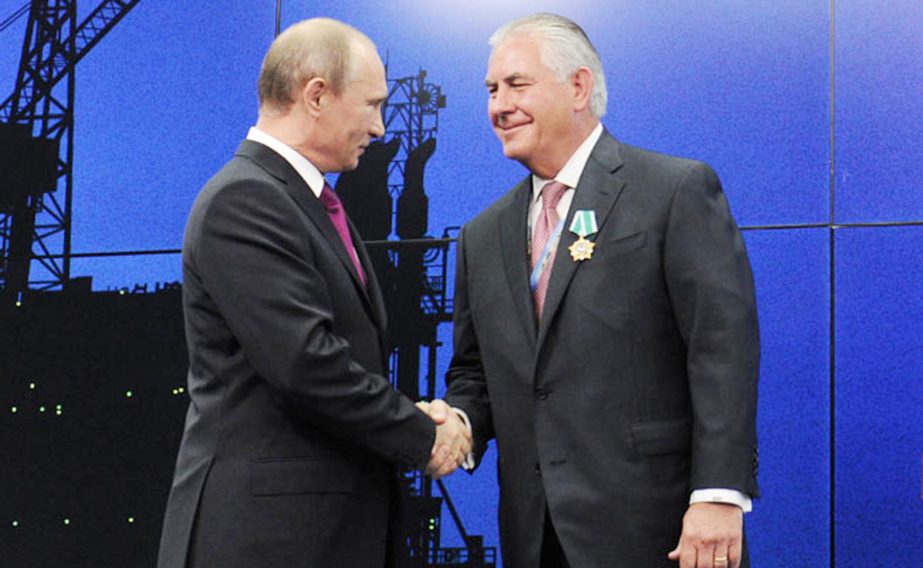
The Washington Post :
When ExxonMobil chief executive Rex Tillerson showed up in June at the annual St. Petersburg international economic forum that is dubbed Russia’s Davos, he was asked about the impact international sanctions on Russia were having on his company, which had abandoned ambitious drilling plans there.
“It’s a question for the government – if you find anyone from the U.S. government who’s willing to answer this question,” he replied to laughter from the audience of Western executives, who had been lavishing praise on their Russian hosts.
It was the first time in three years that Tillerson or most other chief executives had attended the confab, for the moment laying aside friction over Russia’s abrupt annexation of Crimea and its backing of violent separatist forces in eastern Ukraine. Back in Washington, the State Department was not amused. State Department spokesman John Kirby commented that “most American companies understand” that taking part in the forum “sends the wrong message about the acceptability of Russia’s actions.”
Six months later, Tillerson’s relationships with autocrats remain a source of friction after his surprise appointment by President-elect Donald Trump to be secretary of state. The ExxonMobil chief’s ties to Russia have alarmed hawks in Congress, who vow to scrutinize Tillerson’s good working relationship with President Putin and the latter’s longtime confidante Igor Sechin, the chairman of the Russian petroleum giant Rosneft.
With his nomination, the 64-year-old Tillerson has been thrust into the long-standing U.S. foreign-policy divide separating those who value pragmatism and dealmaking, and those who attach greater importance to principles, human rights and democracy. This is a divide that cuts across both parties.
Should he be confirmed, Tillerson will no longer answer to the more than 93,000 shareholders of ExxonMobil but primarily to a single shareholder named Trump. And he will draw on views refined in industry, not diplomacy.
To fans of Tillerson, his relationship with Putin is a sign of his pragmatism, seeking advantage for his company with a blunt, straightforward style that has won respect abroad. Speaking to students from the Texas Tech business school last year, Tillerson said the reason “why I’ve been able to gain Vladimir Putin’s trust” is “because throughout my career I’ve wanted people to view me as an honest person.”
To his critics, however, Tillerson and ExxonMobil come across as arrogant and indifferent to Russia’s record in Ukraine or Putin’s harsh suppression of domestic opposition. The oil giant’s vast enterprise spanning six continents and more than 50 nations has embraced a varied cast of national leaders, including the Saudi oil ministers, Equatorial Guinea’s corrupt Teodoro Obiang Nguema, the autocratic government of Kazakhstan and the emir of Qatar.
These contrary views are in some ways connected. Edward Verona, who worked for ExxonMobil for two years and spent several more working in Moscow, said one reason Tillerson was respected in Moscow was because of the way the company dealt with Venezuela’s then-president, the voluble Hugo Chávez.
When ExxonMobil chief executive Rex Tillerson showed up in June at the annual St. Petersburg international economic forum that is dubbed Russia’s Davos, he was asked about the impact international sanctions on Russia were having on his company, which had abandoned ambitious drilling plans there.
“It’s a question for the government – if you find anyone from the U.S. government who’s willing to answer this question,” he replied to laughter from the audience of Western executives, who had been lavishing praise on their Russian hosts.
It was the first time in three years that Tillerson or most other chief executives had attended the confab, for the moment laying aside friction over Russia’s abrupt annexation of Crimea and its backing of violent separatist forces in eastern Ukraine. Back in Washington, the State Department was not amused. State Department spokesman John Kirby commented that “most American companies understand” that taking part in the forum “sends the wrong message about the acceptability of Russia’s actions.”
Six months later, Tillerson’s relationships with autocrats remain a source of friction after his surprise appointment by President-elect Donald Trump to be secretary of state. The ExxonMobil chief’s ties to Russia have alarmed hawks in Congress, who vow to scrutinize Tillerson’s good working relationship with President Putin and the latter’s longtime confidante Igor Sechin, the chairman of the Russian petroleum giant Rosneft.
With his nomination, the 64-year-old Tillerson has been thrust into the long-standing U.S. foreign-policy divide separating those who value pragmatism and dealmaking, and those who attach greater importance to principles, human rights and democracy. This is a divide that cuts across both parties.
Should he be confirmed, Tillerson will no longer answer to the more than 93,000 shareholders of ExxonMobil but primarily to a single shareholder named Trump. And he will draw on views refined in industry, not diplomacy.
To fans of Tillerson, his relationship with Putin is a sign of his pragmatism, seeking advantage for his company with a blunt, straightforward style that has won respect abroad. Speaking to students from the Texas Tech business school last year, Tillerson said the reason “why I’ve been able to gain Vladimir Putin’s trust” is “because throughout my career I’ve wanted people to view me as an honest person.”
To his critics, however, Tillerson and ExxonMobil come across as arrogant and indifferent to Russia’s record in Ukraine or Putin’s harsh suppression of domestic opposition. The oil giant’s vast enterprise spanning six continents and more than 50 nations has embraced a varied cast of national leaders, including the Saudi oil ministers, Equatorial Guinea’s corrupt Teodoro Obiang Nguema, the autocratic government of Kazakhstan and the emir of Qatar.
These contrary views are in some ways connected. Edward Verona, who worked for ExxonMobil for two years and spent several more working in Moscow, said one reason Tillerson was respected in Moscow was because of the way the company dealt with Venezuela’s then-president, the voluble Hugo Chávez.

